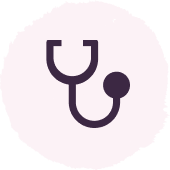


Egg Retrieval Process
At Bay IVF, you do not need to go to a hospital for the egg retrieval procedure; it is performed right at our Clinic


How do I prepare for egg retrieval? How long does egg retrieval take? What happens after egg retrieval?
These are the most commonly asked questions related to the egg retrieval process.
Introduction
The egg retrieval process for In Vitro Fertilization (IVF) has come a long way since its inception. With advancements in technology and medical expertise, the procedure has become relatively straightforward and comfortable for patients. This article provides an overview of the egg retrieval process, from preparation to what happens during and after the procedure.
Preparing for the Procedure:
- Patients are advised not to eat or drink after midnight on the night before the egg retrieval to prepare for the upcoming procedure.
- An hour before arriving at the clinic, patients are asked to take Triazolam, a relaxation pill that helps ease apprehension.
Arriving at the Clinic:
- Upon arrival, vital signs are taken, and the patient is brought to the procedure room, where they change into a hospital gown.
- An IV line is started through which pain medications will be administered.
Egg Retrieval Procedure
The egg retrieval procedure is a quick and relatively painless process that typically takes only 5 to 10 minutes to complete. Here’s what happens during the procedure:
Administering Pain Medication:
- Dr. Polansky administers pain medication and relaxation drugs through the IV line, inducing a state of twilight anesthesia.
- Some patients may fall asleep during the procedure, while others might remain awake and view the egg retrieval on an ultrasound screen.
Egg Retrieval Process:
- Under ultrasound guidance, Dr. Polansky retrieves eggs from the ovaries using a thin needle passed through the top of the vagina.
- The needle aspirates the follicular fluid containing the eggs. The process is usually completed within minutes.
- Embryologists then examine the follicular fluid under a microscope for identification of eggs.
Post-Retrieval:
- After the procedure, patients may experience mild to moderate abdominal cramping, for which they can take Tylenol for comfort.
- The medications used for the procedure are short-acting and will be out of the patient’s system by the time they leave the clinic (about 45 to 60 minutes after the procedure).
What Happens After Egg Retrieval
The post-retrieval phase involves waiting for the fertilization process and understanding the next steps in the treatment:
Receiving the Egg Count Report:
- Approximately 15-30 minutes after the egg retrieval, the embryologists provide information about the number of eggs retrieved.
- The highest quality sperm is extracted from the male partner’s semen and combined with the eggs three hours after the retrieval.
Going Home:
- After receiving the fertilization report, patients can get dressed and leave the clinic for home.
- Most patients take it easy for the rest of the day, although some return to work after the procedure.
Conclusion: Egg retrieval for IVF has evolved significantly over the years, making it a safe and comfortable process for patients. Adequate preparation, skilled medical personnel, and modern technology contribute to the procedure’s success.
Understanding the steps involved and what to expect before, during, and after egg retrieval can help alleviate concerns and contribute to a positive experience for individuals undergoing this vital fertility treatment.
Meet Your Doctor

- Dr. Polansky received his medical diploma from Charles University in Prague, the Czech Republic, in 1978.
- After completing his OB/GYN residency at Jewish Hospital in Saint Louis, MO, he graduated from the Reproductive Endocrinology and Infertility (REI) fellowship at Stanford University in 1985.
- In the same year, he co-founded the Stanford IVF Clinic.
- Dr. Polansky obtained board certification in Obstetrics and Gynecology in 1986 and became REI subspecialty board certified in 1988.
- In 1987, he left Stanford University and established Nova IVF.
- In 2011, he founded Bay IVF, where he provides advanced fertility treatments with a holistic approach, utilizing state-of-the-art techniques.
- Dr. Polansky personally performs ultrasound examinations, egg retrievals, embryo transfers, and ovarian and endometrial stimulations for his patients.
- He is deeply committed to his patients and freely shares his cell phone number, ensuring accessibility and availability 24/7.
Frank Polansky, M.D.



Initial Appointment Questions
When you call to schedule your consultation, one of our Front Office Coordinators will ask you a short series of questions regarding your reproductive history.
Your Initial Visit at Bay IVF
Attending a new patient appointment at a fertility clinic can be stressful. Our primary objective is to ensure that your initial visit is friendly and relaxing. We encourage you to ask questions at every step of the process.

1 — When You Arrive
You will be welcomed by one of the clinic receptionists. One of our nurses will measure your height and weight and take your blood pressure

2 — Meet Your Doctor
Dr. Polansky will ask you a series of clarifying questions and then provide you with a summary of the factors contributing to your infertility

4 — Exam Room
One of the nurses will escort you to an examination room. Your examination will begin with listening to your lungs and heart

3 — Ask Your Questions
You will then have a discussion with him about the most suitable reproductive treatment(s) for you. During this time, you will have the opportunity to ask any questions you may have

5 — Ultrasound of the Ovaries
The next step is a pelvic ultrasound to examine the uterus and ovaries. This ultrasound will help determine the number of antral follicles present within the ovaries

6 — Financial Part
Following that, you will have a discussion with one of the financial advisors regarding the financial aspects of your treatment, including potential treatment financing options

8 — Support 24/7
If you have any questions after leaving the clinic, please feel free to reach out to us via phone call, text, or email. Open and discreet communication is an integral part of the care we provide at Bay IVF

7 — What About Time?
Your entire visit is expected to last approximately one hour


Schedule Your Initial Consultation With Dr. Polansky
Online (No Cost) or In-Person
Call or Text Us: 650-322-0500
You can also complete the form below to request your initial consultation


We look forward to meeting you at Bay IVF and, when your treatment is successful, celebrating your new pregnancy!








